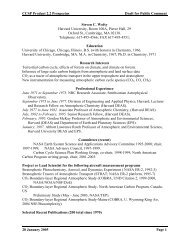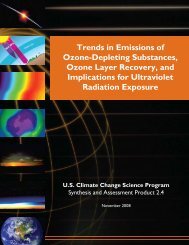Decision support experiments and evaluations using seasonal to ...
Decision support experiments and evaluations using seasonal to ...
Decision support experiments and evaluations using seasonal to ...
Create successful ePaper yourself
Turn your PDF publications into a flip-book with our unique Google optimized e-Paper software.
PREFACE<br />
Report Motivation <strong>and</strong> Guidance for Using<br />
this Synthesis/Assessment Report<br />
<strong>Decision</strong>-Support Experiments <strong>and</strong> Evaluations <strong>using</strong> Seasonal <strong>to</strong><br />
Interannual Forecasts <strong>and</strong> Observational Data: A Focus on Water Resources<br />
Convening Lead Author: Nancy Beller-Simms, NOAA<br />
Lead Authors: Helen Ingram, Univ. of Arizona; David Feldman, Univ. of California, Irvine;<br />
Nathan Mantua, Climate Impacts Group, Univ. of Washing<strong>to</strong>n; Katharine L. Jacobs, Arizona<br />
Water Institute<br />
Edi<strong>to</strong>r: Anne M. Waple, STG, Inc.<br />
P.1 MOTIVATION AND GUIDANCE<br />
FOR USING THIS SYNTHESIS AND<br />
ASSESSMENT PRODUCT<br />
The core mission of the U.S. Climate Change Science<br />
Program (CCSP) is <strong>to</strong> “Facilitate the creation <strong>and</strong> application<br />
of knowledge of the Earth’s global environment<br />
through research, observations, decision <strong>support</strong>, <strong>and</strong><br />
communication”. To accomplish this goal, the CCSP has<br />
commissioned 21 Synthesis <strong>and</strong> Assessment Products <strong>to</strong><br />
summarize current knowledge <strong>and</strong> evaluate the extent<br />
<strong>and</strong> development of this knowledge for future scientific<br />
explorations <strong>and</strong> policy planning.<br />
These Products fall within five goals, namely:<br />
1. Improve knowledge of the Earth’s past <strong>and</strong> present<br />
climate <strong>and</strong> environment, including its natural variability,<br />
<strong>and</strong> improve underst<strong>and</strong>ing of the causes of<br />
observed variability <strong>and</strong> change;<br />
2. Improve quantification of the forces bringing about<br />
changes in the Earth’s climate <strong>and</strong> related systems;<br />
3. Reduce uncertainty in projections of how the Earth’s<br />
climate <strong>and</strong> environmental systems may change in<br />
the future;<br />
4. Underst<strong>and</strong> the sensitivity <strong>and</strong> adaptability of different<br />
natural <strong>and</strong> managed ecosystems <strong>and</strong> human<br />
systems <strong>to</strong> climate <strong>and</strong> related global changes; <strong>and</strong><br />
5. Explore the uses <strong>and</strong> identify the limits of evolving<br />
knowledge <strong>to</strong> manage risks <strong>and</strong> opportunities related<br />
<strong>to</strong> climate variability <strong>and</strong> change.<br />
CCSP Synthesis <strong>and</strong> Assessment Product 5.3 is one of<br />
three products <strong>to</strong> be developed for the final goal.<br />
This Product directly addresses decision-<strong>support</strong> <strong>experiments</strong><br />
<strong>and</strong> <strong>evaluations</strong> that have used <strong>seasonal</strong>-<strong>to</strong>-interannual<br />
forecasts <strong>and</strong> observational data, <strong>and</strong> is expected <strong>to</strong><br />
inform (1) decision makers about the experiences of others<br />
who have experimented with these forecasts <strong>and</strong> data in<br />
resource management; (2) clima<strong>to</strong>logists, hydrologists, <strong>and</strong><br />
social scientists on how <strong>to</strong> advance the delivery of decision<strong>support</strong><br />
resources that use the most recent forecast products,<br />
methodologies, <strong>and</strong> <strong>to</strong>ols; <strong>and</strong> (3) science <strong>and</strong> resource managers<br />
as they plan for future investments in research related<br />
<strong>to</strong> forecasts <strong>and</strong> their role in decision <strong>support</strong>.<br />
P.2 BACKGROUND<br />
Gaining a better underst<strong>and</strong>ing of how <strong>to</strong> provide better<br />
decision <strong>support</strong> <strong>to</strong> decision <strong>and</strong> policy makers is of prime<br />
importance <strong>to</strong> the CCSP, <strong>and</strong> it has put considerable effort<br />
<strong>and</strong> resources <strong>to</strong>wards achieving this goal. For example,<br />
within its Strategic Plan, the CCSP identifies decision <strong>support</strong><br />
as one of its four core approaches <strong>to</strong> achieving its mission<br />
1. The plan endorses the transfer of knowledge gained<br />
from science in a format that is usable <strong>and</strong> underst<strong>and</strong>able,<br />
<strong>and</strong> indicates levels of uncertainty <strong>and</strong> confidence. CCSP<br />
expects that the resulting <strong>to</strong>ols will promote the development<br />
of new models, <strong>to</strong>ols, <strong>and</strong> methods that will improve<br />
current economic <strong>and</strong> policy analyses as well as advance<br />
environmental management <strong>and</strong> decision making.<br />
CCSP has also encouraged the authors of the 21 Synthesis<br />
<strong>and</strong> Assessment Products <strong>to</strong> <strong>support</strong> informed decision making<br />
on climate variability <strong>and</strong> change. Most of the Synthesis<br />
<strong>and</strong> Assessment Products’ Prospectuses have outlined efforts<br />
<strong>to</strong> involve decision makers, including a broad group of<br />
stakeholders, policy makers, resource managers, media, <strong>and</strong><br />
the general public, as either writers or as special workshop/<br />
meeting participants. Inclusion of decision makers in the<br />
Synthesis <strong>and</strong> Assessment Products also helps <strong>to</strong> fulfill the<br />
requirements of the Global Change Research Act (GCRA) of<br />
1990 (P.L. 101-606, Section 106), which directs the program<br />
1 The four core approaches of CCSP include science, observations,<br />
decision <strong>support</strong>, <strong>and</strong> communications.<br />
XI




